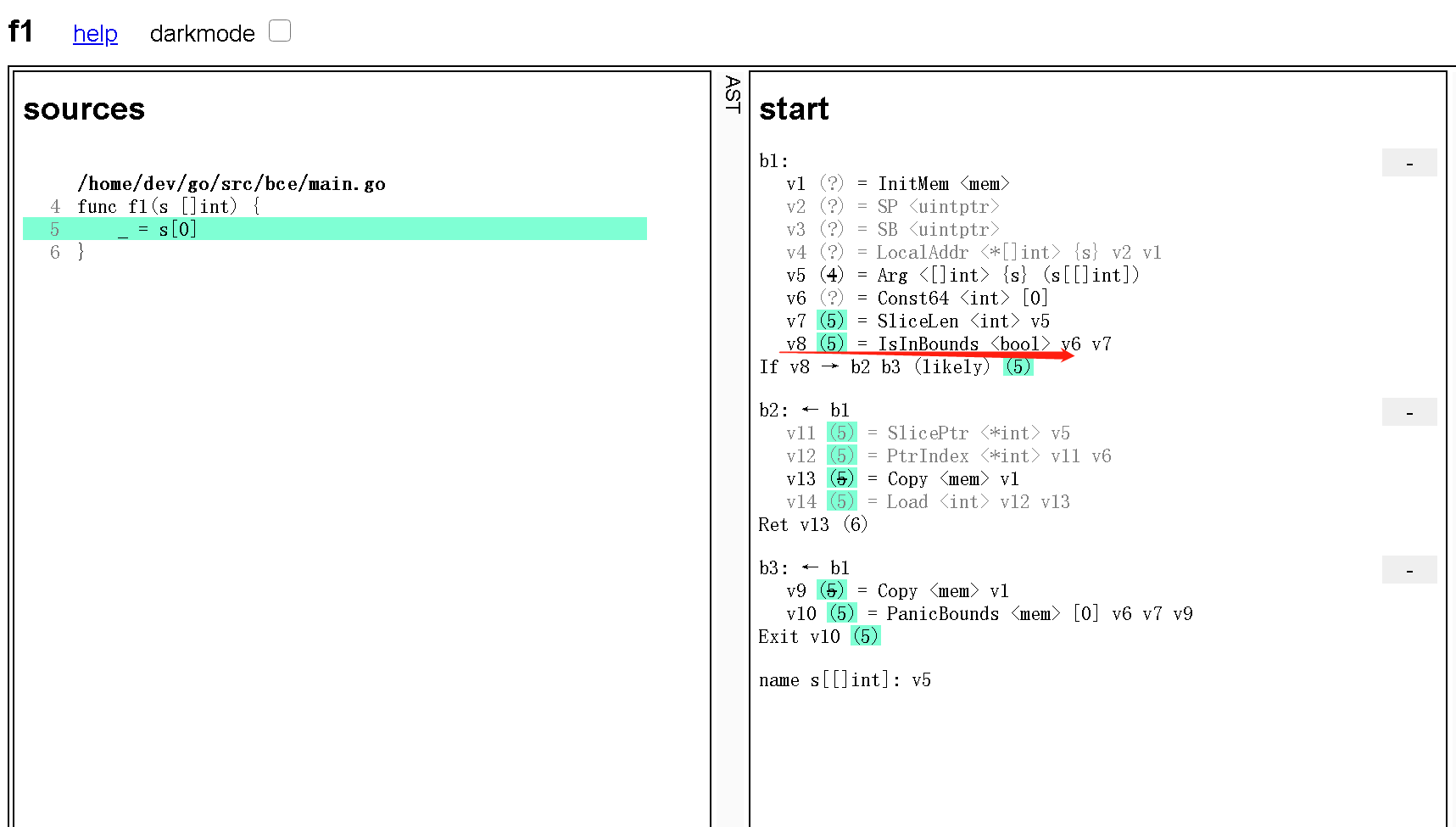前言
我们在阅读go源码时,很多地方在操作数组或切片时,会有bounds check的注释, 比如go map在对tophash指定索引赋值(go map的源码阅读见 go map源码阅读及与php map实现对比这篇文章):
1
2
3
dst.b.tophash[dst.i&(bucketCnt-1)] = top // mask dst.i as an optimization, to avoid a bounds check
类似的地方还有很多,
那bounds check是什么呢?为什么要这么做呢?该如何做呢?
bounds check是什么
我们知道,go是一个编译型语言,而且还是一个内存安全的语言。在操作数组或切片的索引时,我们不用手动检查是否出现了数组越界,go的运行时会帮我们检查,如果出现数组越界,会抛出panic。
而bounds check说的就是对数组或切片的索引操作进行越界检查。
为什么要这么做
虽然有go 运行时帮我们来做越界检查,但是相应的,大量的bounds check无法使我们的程序达到最高的运行效率。那我们能不能减少或消除运行时的bounds check呢?
该如何做
幸好,go 编译器提供了检测命令来帮助我们来找出哪些地方进行了bounds check.
我们可以通过查看ssa,具体下面两个方法来查看:
1.直接查看ssa生成,GOSSAFUNC=func go build go file
2.使用命令查看ssa的check_bce阶段:go build -gcflags=”-d=ssa/check_bce/debug”
其结构为:-d=ssa/<phase>/<flag>[=<value>|<function_name>]
value默认为1
如:
1
2
3
4
5
6
7
8
package main
func f1(s []int) {
_ = s[0]
}
func main() {}
使用方法一,可以看到如下信息:

使用方法二,可以看到如下信息:
1
2
3
4
# bce
./main.go:5:7: Found IsInBounds
实际代码中,推荐使用方法2来定位,输出更简洁。
我们看下消除情况:
1
2
3
4
5
6
7
8
9
10
11
12
13
func f1(s []int) {
_ = s[0] // bounds check
_ = s[1] // bounds check
_ = s[2] // bounds check
}
func f2(s []int) {
_ = s[2] // bounds check
_ = s[0] // bounds check 消除
_ = s[1] // bounds check 消除
}
上面中f2中,因为检测了了s[2],编译器可以消除s[0]和s[1]的边界检查。
再如:
1
2
3
4
5
_ = dst.b.tophash[dst.i&(bucketCnt-1)] // 边界消除。&操作符保证了index落在范围内
_ = dst.b.tophash[dst.i%(bucketCnt-1)] // bounds check。%操作符无法保证index落在范围内,可能有负数
有一种情况:
1
2
3
4
5
6
var s[]int
var index int
_ = s[:index] // bounds check
_ = s[index:] // bounds check
为什么会这样?因为s[a:b]中需要 0 <= a <= len(s), a <= b <= cap(s)
所以需要检测index是否越界。
我们可以利用边界检测消除来提升程序性能,如下,我们通过给编译器增加提示来达到边界消除:
1
2
3
4
5
6
7
8
9
10
11
12
13
14
15
16
17
18
func fd(is []int, bs []byte) {
if len(is) >= 256 {
for _, n := range bs {
_ = is[n] // bounds check
}
}
}
func fd2(is []int, bs []byte) {
if len(is) >= 256 {
is = is[:256] // 给编译器增加一个提示,可以避免下面for中的边界检测
for _, n := range bs {
_ = is[n] // 边界检测消除
}
}
}
参考: